Unilever's Leadership, Management and Operations: A Detailed Report
VerifiedAdded on 2020/10/05
|12
|3516
|134
Report
AI Summary
This report provides a comprehensive analysis of leadership and management, focusing on the distinctions between leaders and managers, exploring their roles, characteristics, and functions within an organizational context, particularly within Unilever. The report details the roles of leaders in strategy formulation and organizational representation, alongside the decisional and interpersonal roles of managers. It also delves into the similarities and differences between leaders and managers, highlighting the importance of effective decision-making and communication. The report further examines various leadership theories, including situational leadership, and their application. Finally, it addresses the key approaches to operations management and the factors influencing it. This report serves as a valuable resource for understanding the complexities of leadership and management in the business world.
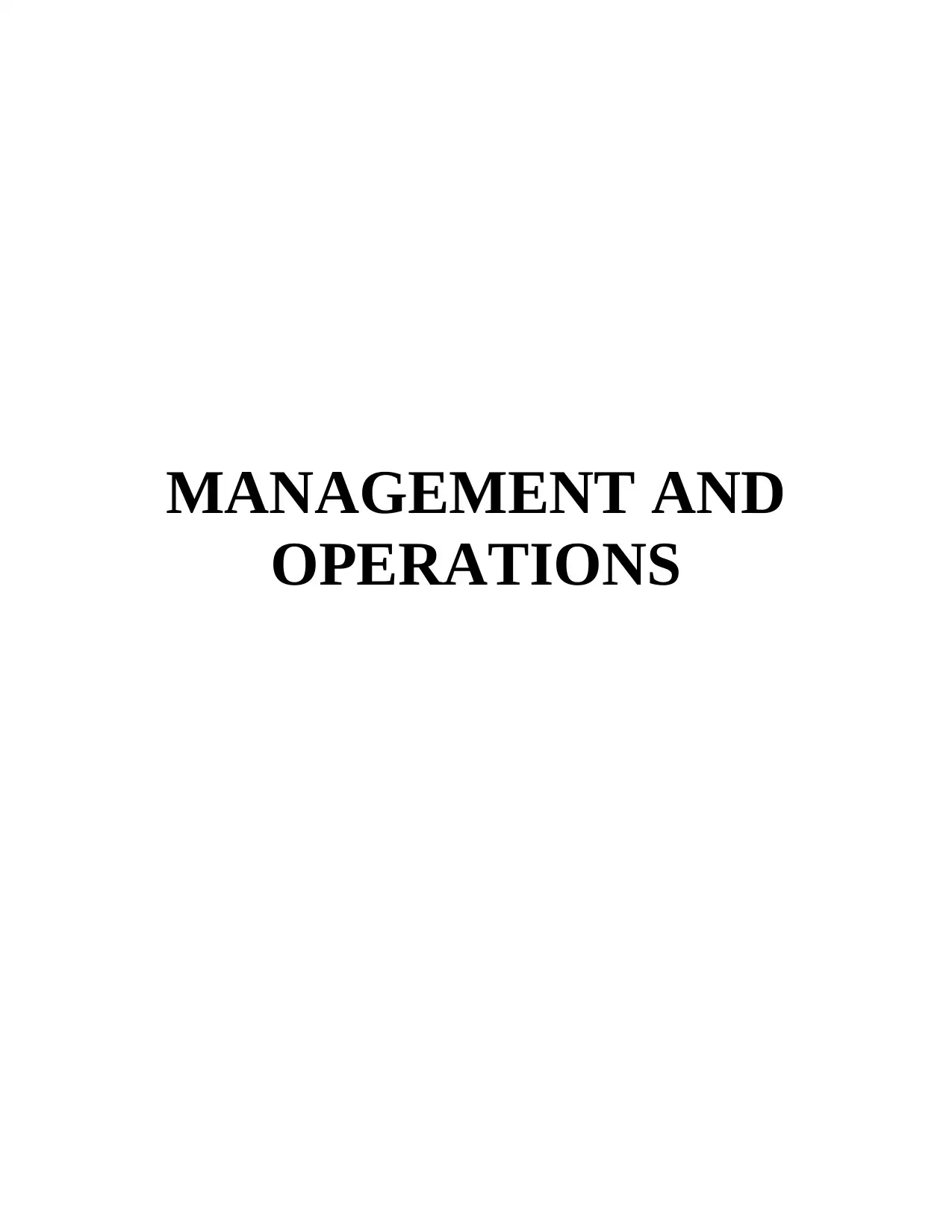
MANAGEMENT AND
OPERATIONS
OPERATIONS
Paraphrase This Document
Need a fresh take? Get an instant paraphrase of this document with our AI Paraphraser
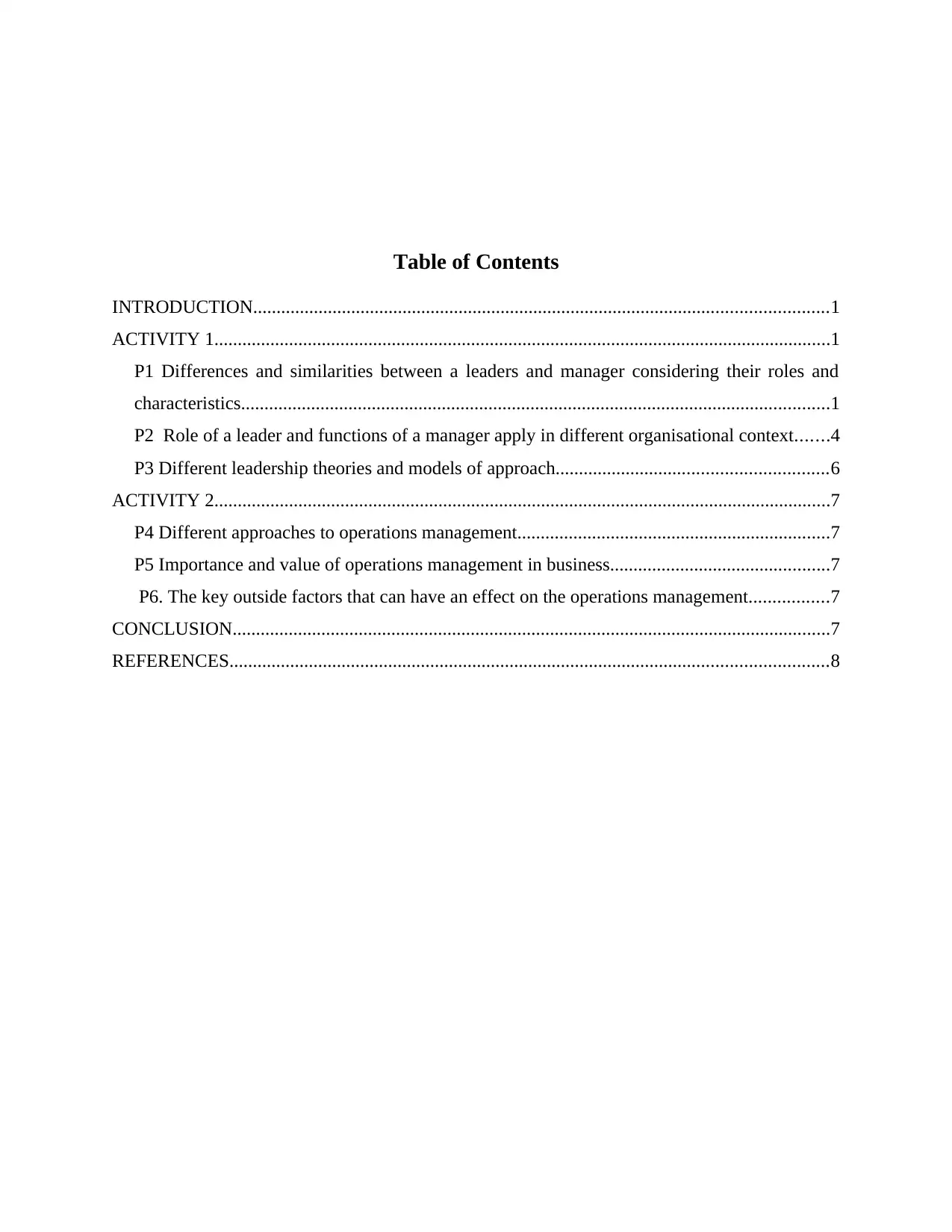
Table of Contents
INTRODUCTION...........................................................................................................................1
ACTIVITY 1....................................................................................................................................1
P1 Differences and similarities between a leaders and manager considering their roles and
characteristics..............................................................................................................................1
P2 Role of a leader and functions of a manager apply in different organisational context.......4
P3 Different leadership theories and models of approach..........................................................6
ACTIVITY 2....................................................................................................................................7
P4 Different approaches to operations management...................................................................7
P5 Importance and value of operations management in business...............................................7
P6. The key outside factors that can have an effect on the operations management.................7
CONCLUSION................................................................................................................................7
REFERENCES................................................................................................................................8
INTRODUCTION...........................................................................................................................1
ACTIVITY 1....................................................................................................................................1
P1 Differences and similarities between a leaders and manager considering their roles and
characteristics..............................................................................................................................1
P2 Role of a leader and functions of a manager apply in different organisational context.......4
P3 Different leadership theories and models of approach..........................................................6
ACTIVITY 2....................................................................................................................................7
P4 Different approaches to operations management...................................................................7
P5 Importance and value of operations management in business...............................................7
P6. The key outside factors that can have an effect on the operations management.................7
CONCLUSION................................................................................................................................7
REFERENCES................................................................................................................................8
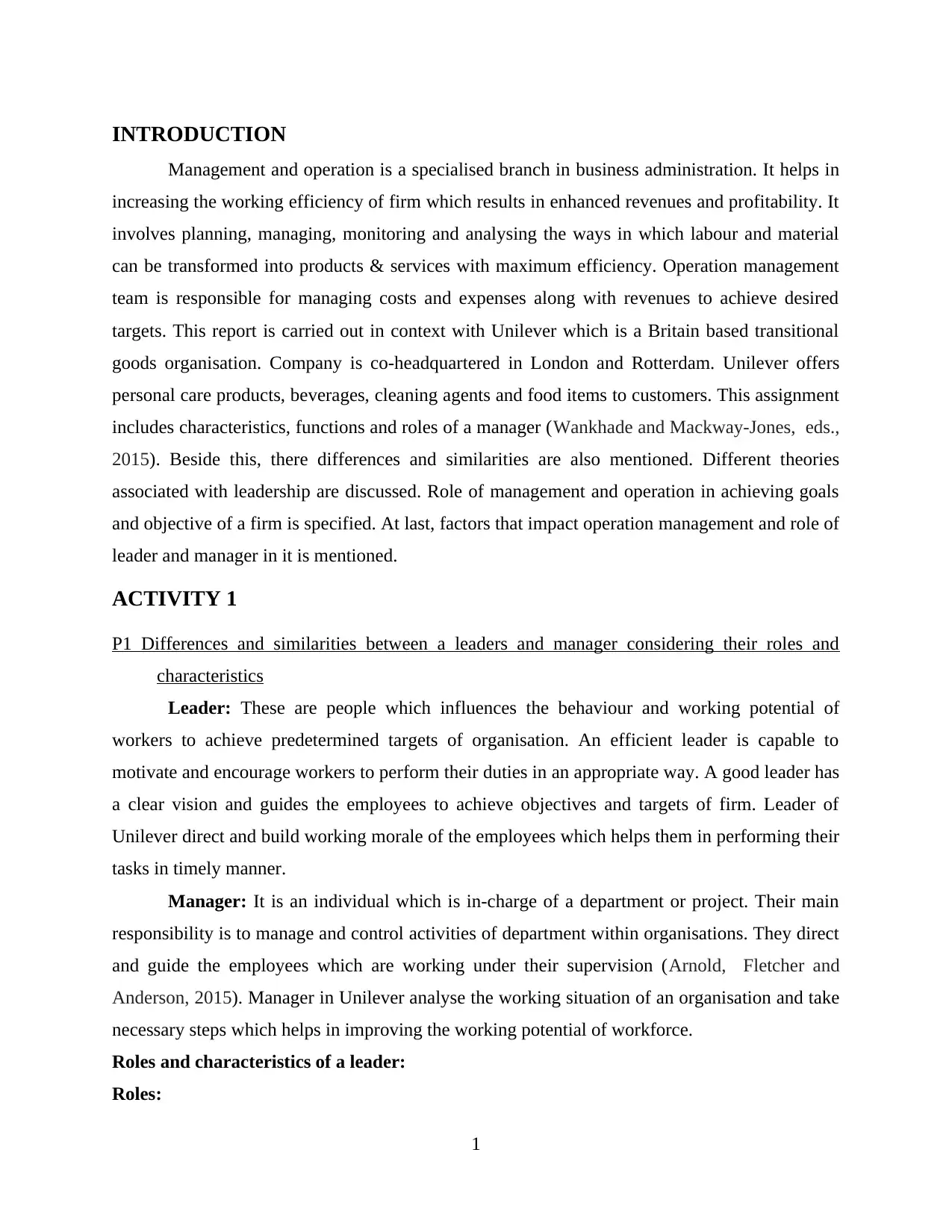
INTRODUCTION
Management and operation is a specialised branch in business administration. It helps in
increasing the working efficiency of firm which results in enhanced revenues and profitability. It
involves planning, managing, monitoring and analysing the ways in which labour and material
can be transformed into products & services with maximum efficiency. Operation management
team is responsible for managing costs and expenses along with revenues to achieve desired
targets. This report is carried out in context with Unilever which is a Britain based transitional
goods organisation. Company is co-headquartered in London and Rotterdam. Unilever offers
personal care products, beverages, cleaning agents and food items to customers. This assignment
includes characteristics, functions and roles of a manager (Wankhade and Mackway-Jones, eds.,
2015). Beside this, there differences and similarities are also mentioned. Different theories
associated with leadership are discussed. Role of management and operation in achieving goals
and objective of a firm is specified. At last, factors that impact operation management and role of
leader and manager in it is mentioned.
ACTIVITY 1
P1 Differences and similarities between a leaders and manager considering their roles and
characteristics
Leader: These are people which influences the behaviour and working potential of
workers to achieve predetermined targets of organisation. An efficient leader is capable to
motivate and encourage workers to perform their duties in an appropriate way. A good leader has
a clear vision and guides the employees to achieve objectives and targets of firm. Leader of
Unilever direct and build working morale of the employees which helps them in performing their
tasks in timely manner.
Manager: It is an individual which is in-charge of a department or project. Their main
responsibility is to manage and control activities of department within organisations. They direct
and guide the employees which are working under their supervision (Arnold, Fletcher and
Anderson, 2015). Manager in Unilever analyse the working situation of an organisation and take
necessary steps which helps in improving the working potential of workforce.
Roles and characteristics of a leader:
Roles:
1
Management and operation is a specialised branch in business administration. It helps in
increasing the working efficiency of firm which results in enhanced revenues and profitability. It
involves planning, managing, monitoring and analysing the ways in which labour and material
can be transformed into products & services with maximum efficiency. Operation management
team is responsible for managing costs and expenses along with revenues to achieve desired
targets. This report is carried out in context with Unilever which is a Britain based transitional
goods organisation. Company is co-headquartered in London and Rotterdam. Unilever offers
personal care products, beverages, cleaning agents and food items to customers. This assignment
includes characteristics, functions and roles of a manager (Wankhade and Mackway-Jones, eds.,
2015). Beside this, there differences and similarities are also mentioned. Different theories
associated with leadership are discussed. Role of management and operation in achieving goals
and objective of a firm is specified. At last, factors that impact operation management and role of
leader and manager in it is mentioned.
ACTIVITY 1
P1 Differences and similarities between a leaders and manager considering their roles and
characteristics
Leader: These are people which influences the behaviour and working potential of
workers to achieve predetermined targets of organisation. An efficient leader is capable to
motivate and encourage workers to perform their duties in an appropriate way. A good leader has
a clear vision and guides the employees to achieve objectives and targets of firm. Leader of
Unilever direct and build working morale of the employees which helps them in performing their
tasks in timely manner.
Manager: It is an individual which is in-charge of a department or project. Their main
responsibility is to manage and control activities of department within organisations. They direct
and guide the employees which are working under their supervision (Arnold, Fletcher and
Anderson, 2015). Manager in Unilever analyse the working situation of an organisation and take
necessary steps which helps in improving the working potential of workforce.
Roles and characteristics of a leader:
Roles:
1
⊘ This is a preview!⊘
Do you want full access?
Subscribe today to unlock all pages.

Trusted by 1+ million students worldwide
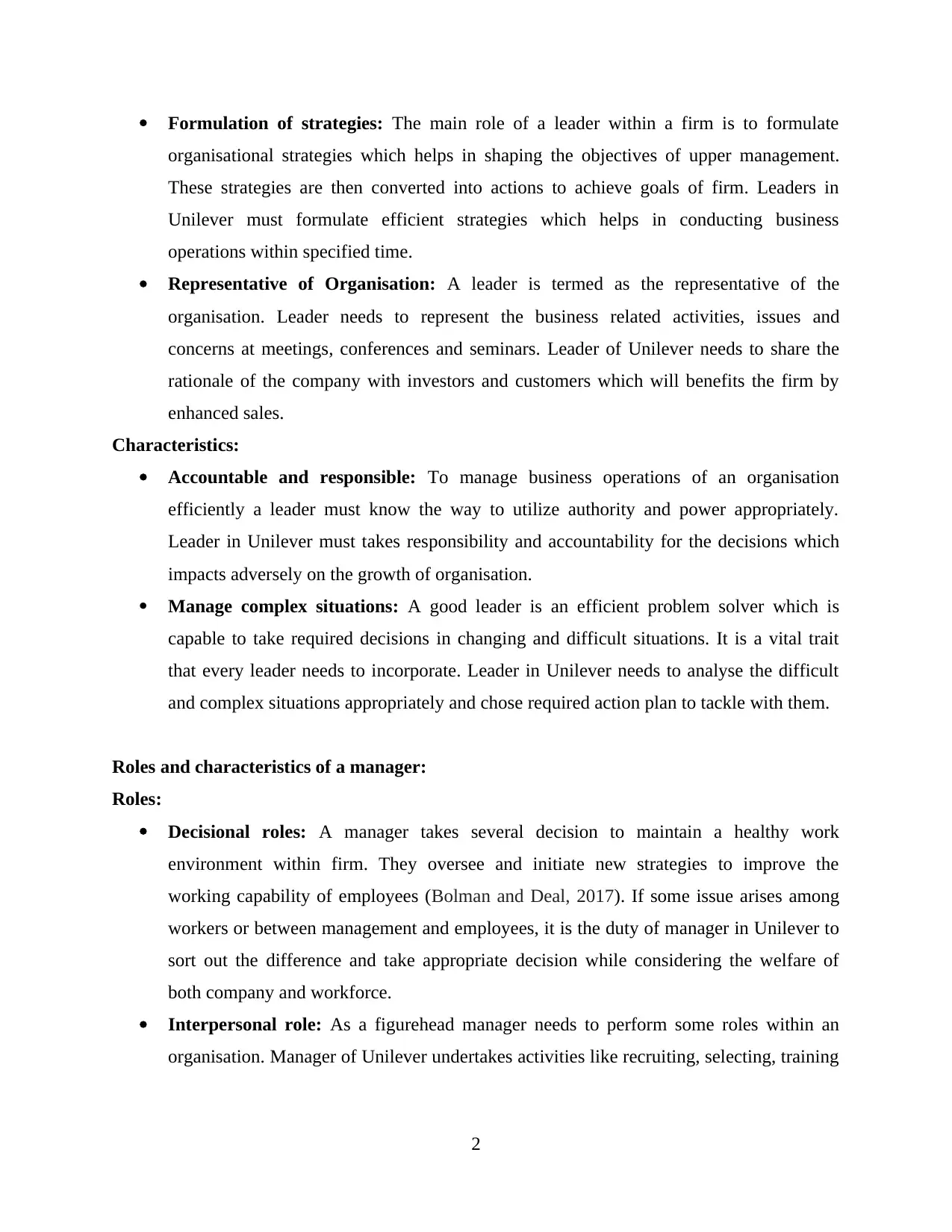
Formulation of strategies: The main role of a leader within a firm is to formulate
organisational strategies which helps in shaping the objectives of upper management.
These strategies are then converted into actions to achieve goals of firm. Leaders in
Unilever must formulate efficient strategies which helps in conducting business
operations within specified time.
Representative of Organisation: A leader is termed as the representative of the
organisation. Leader needs to represent the business related activities, issues and
concerns at meetings, conferences and seminars. Leader of Unilever needs to share the
rationale of the company with investors and customers which will benefits the firm by
enhanced sales.
Characteristics:
Accountable and responsible: To manage business operations of an organisation
efficiently a leader must know the way to utilize authority and power appropriately.
Leader in Unilever must takes responsibility and accountability for the decisions which
impacts adversely on the growth of organisation.
Manage complex situations: A good leader is an efficient problem solver which is
capable to take required decisions in changing and difficult situations. It is a vital trait
that every leader needs to incorporate. Leader in Unilever needs to analyse the difficult
and complex situations appropriately and chose required action plan to tackle with them.
Roles and characteristics of a manager:
Roles:
Decisional roles: A manager takes several decision to maintain a healthy work
environment within firm. They oversee and initiate new strategies to improve the
working capability of employees (Bolman and Deal, 2017). If some issue arises among
workers or between management and employees, it is the duty of manager in Unilever to
sort out the difference and take appropriate decision while considering the welfare of
both company and workforce.
Interpersonal role: As a figurehead manager needs to perform some roles within an
organisation. Manager of Unilever undertakes activities like recruiting, selecting, training
2
organisational strategies which helps in shaping the objectives of upper management.
These strategies are then converted into actions to achieve goals of firm. Leaders in
Unilever must formulate efficient strategies which helps in conducting business
operations within specified time.
Representative of Organisation: A leader is termed as the representative of the
organisation. Leader needs to represent the business related activities, issues and
concerns at meetings, conferences and seminars. Leader of Unilever needs to share the
rationale of the company with investors and customers which will benefits the firm by
enhanced sales.
Characteristics:
Accountable and responsible: To manage business operations of an organisation
efficiently a leader must know the way to utilize authority and power appropriately.
Leader in Unilever must takes responsibility and accountability for the decisions which
impacts adversely on the growth of organisation.
Manage complex situations: A good leader is an efficient problem solver which is
capable to take required decisions in changing and difficult situations. It is a vital trait
that every leader needs to incorporate. Leader in Unilever needs to analyse the difficult
and complex situations appropriately and chose required action plan to tackle with them.
Roles and characteristics of a manager:
Roles:
Decisional roles: A manager takes several decision to maintain a healthy work
environment within firm. They oversee and initiate new strategies to improve the
working capability of employees (Bolman and Deal, 2017). If some issue arises among
workers or between management and employees, it is the duty of manager in Unilever to
sort out the difference and take appropriate decision while considering the welfare of
both company and workforce.
Interpersonal role: As a figurehead manager needs to perform some roles within an
organisation. Manager of Unilever undertakes activities like recruiting, selecting, training
2
Paraphrase This Document
Need a fresh take? Get an instant paraphrase of this document with our AI Paraphraser
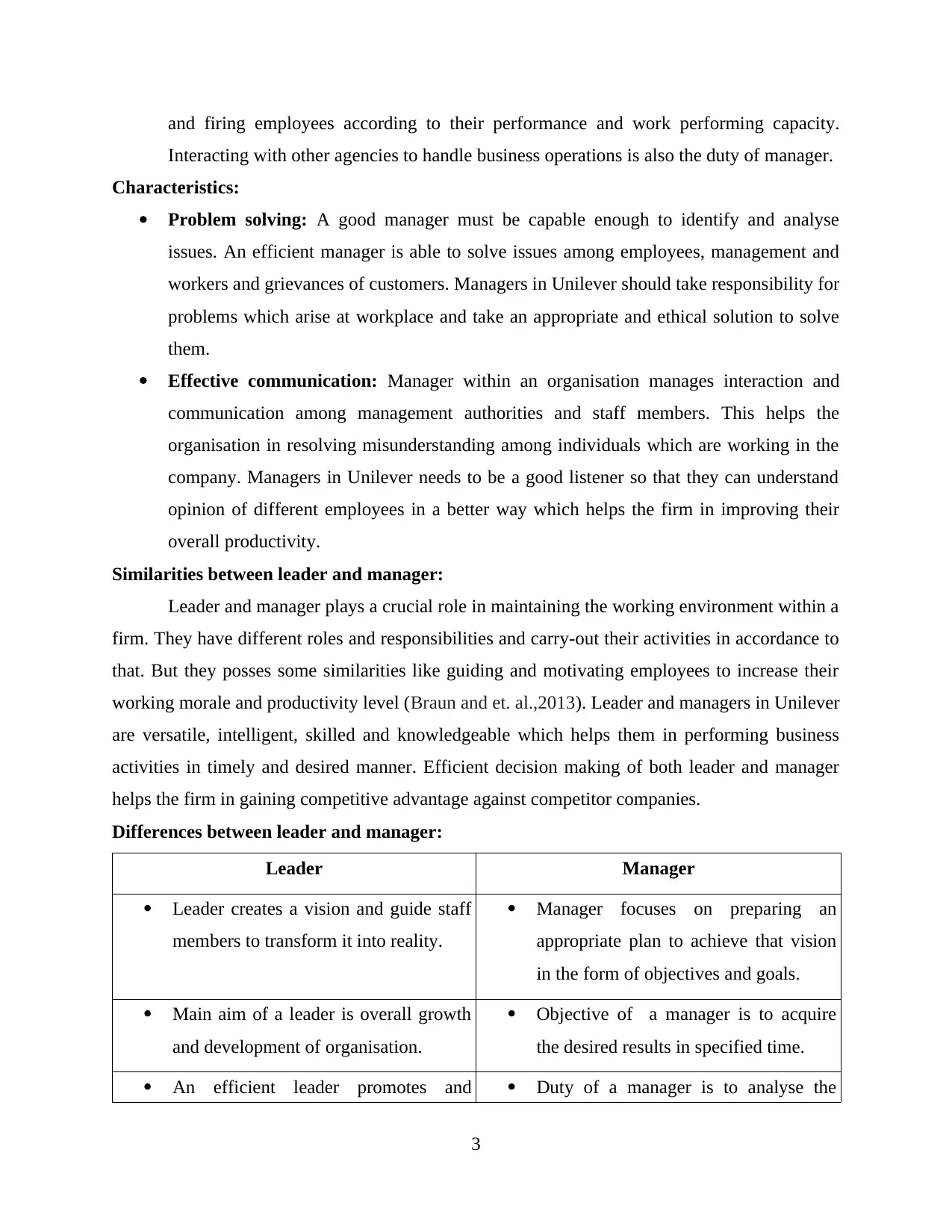
and firing employees according to their performance and work performing capacity.
Interacting with other agencies to handle business operations is also the duty of manager.
Characteristics:
Problem solving: A good manager must be capable enough to identify and analyse
issues. An efficient manager is able to solve issues among employees, management and
workers and grievances of customers. Managers in Unilever should take responsibility for
problems which arise at workplace and take an appropriate and ethical solution to solve
them.
Effective communication: Manager within an organisation manages interaction and
communication among management authorities and staff members. This helps the
organisation in resolving misunderstanding among individuals which are working in the
company. Managers in Unilever needs to be a good listener so that they can understand
opinion of different employees in a better way which helps the firm in improving their
overall productivity.
Similarities between leader and manager:
Leader and manager plays a crucial role in maintaining the working environment within a
firm. They have different roles and responsibilities and carry-out their activities in accordance to
that. But they posses some similarities like guiding and motivating employees to increase their
working morale and productivity level (Braun and et. al.,2013). Leader and managers in Unilever
are versatile, intelligent, skilled and knowledgeable which helps them in performing business
activities in timely and desired manner. Efficient decision making of both leader and manager
helps the firm in gaining competitive advantage against competitor companies.
Differences between leader and manager:
Leader Manager
Leader creates a vision and guide staff
members to transform it into reality.
Manager focuses on preparing an
appropriate plan to achieve that vision
in the form of objectives and goals.
Main aim of a leader is overall growth
and development of organisation.
Objective of a manager is to acquire
the desired results in specified time.
An efficient leader promotes and Duty of a manager is to analyse the
3
Interacting with other agencies to handle business operations is also the duty of manager.
Characteristics:
Problem solving: A good manager must be capable enough to identify and analyse
issues. An efficient manager is able to solve issues among employees, management and
workers and grievances of customers. Managers in Unilever should take responsibility for
problems which arise at workplace and take an appropriate and ethical solution to solve
them.
Effective communication: Manager within an organisation manages interaction and
communication among management authorities and staff members. This helps the
organisation in resolving misunderstanding among individuals which are working in the
company. Managers in Unilever needs to be a good listener so that they can understand
opinion of different employees in a better way which helps the firm in improving their
overall productivity.
Similarities between leader and manager:
Leader and manager plays a crucial role in maintaining the working environment within a
firm. They have different roles and responsibilities and carry-out their activities in accordance to
that. But they posses some similarities like guiding and motivating employees to increase their
working morale and productivity level (Braun and et. al.,2013). Leader and managers in Unilever
are versatile, intelligent, skilled and knowledgeable which helps them in performing business
activities in timely and desired manner. Efficient decision making of both leader and manager
helps the firm in gaining competitive advantage against competitor companies.
Differences between leader and manager:
Leader Manager
Leader creates a vision and guide staff
members to transform it into reality.
Manager focuses on preparing an
appropriate plan to achieve that vision
in the form of objectives and goals.
Main aim of a leader is overall growth
and development of organisation.
Objective of a manager is to acquire
the desired results in specified time.
An efficient leader promotes and Duty of a manager is to analyse the
3
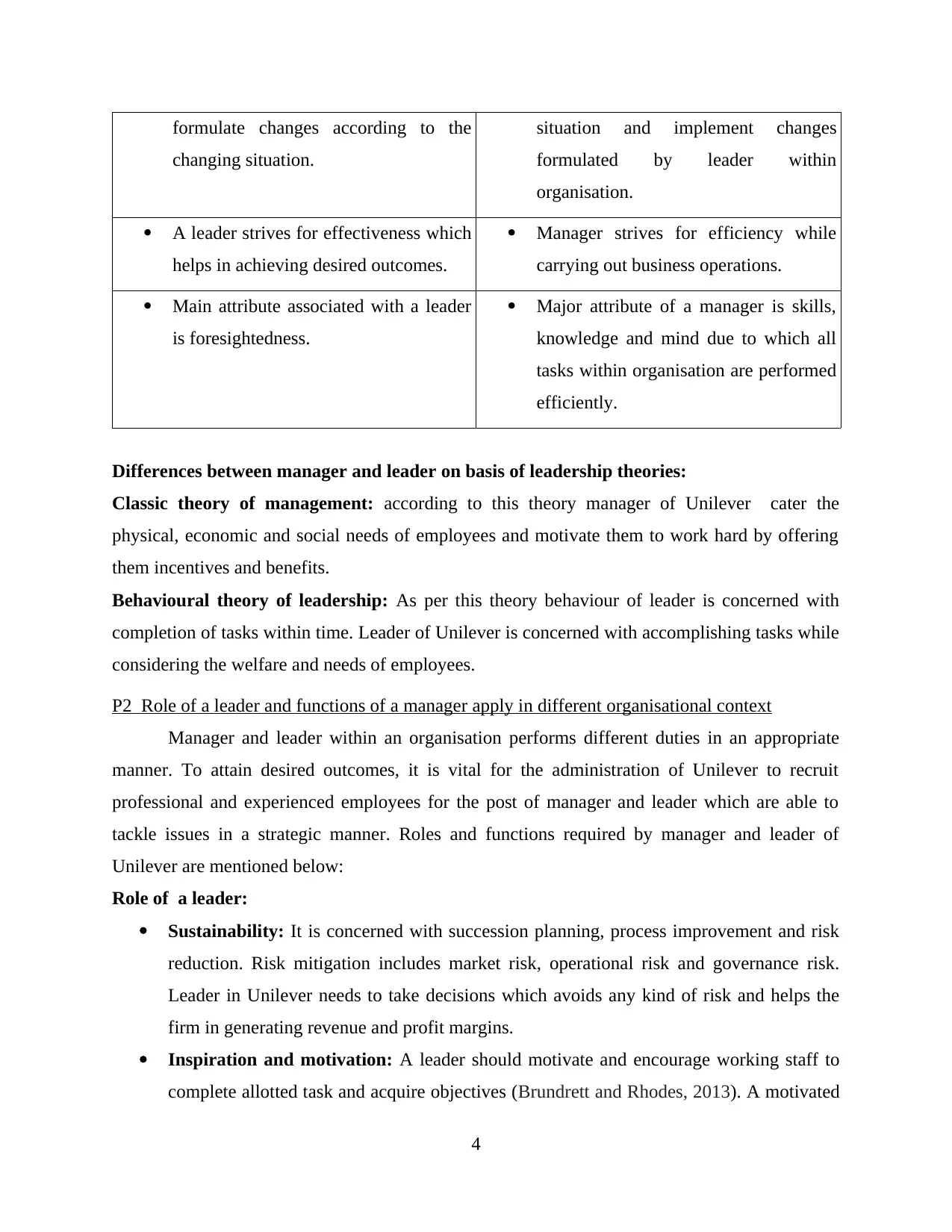
formulate changes according to the
changing situation.
situation and implement changes
formulated by leader within
organisation.
A leader strives for effectiveness which
helps in achieving desired outcomes.
Manager strives for efficiency while
carrying out business operations.
Main attribute associated with a leader
is foresightedness.
Major attribute of a manager is skills,
knowledge and mind due to which all
tasks within organisation are performed
efficiently.
Differences between manager and leader on basis of leadership theories:
Classic theory of management: according to this theory manager of Unilever cater the
physical, economic and social needs of employees and motivate them to work hard by offering
them incentives and benefits.
Behavioural theory of leadership: As per this theory behaviour of leader is concerned with
completion of tasks within time. Leader of Unilever is concerned with accomplishing tasks while
considering the welfare and needs of employees.
P2 Role of a leader and functions of a manager apply in different organisational context
Manager and leader within an organisation performs different duties in an appropriate
manner. To attain desired outcomes, it is vital for the administration of Unilever to recruit
professional and experienced employees for the post of manager and leader which are able to
tackle issues in a strategic manner. Roles and functions required by manager and leader of
Unilever are mentioned below:
Role of a leader:
Sustainability: It is concerned with succession planning, process improvement and risk
reduction. Risk mitigation includes market risk, operational risk and governance risk.
Leader in Unilever needs to take decisions which avoids any kind of risk and helps the
firm in generating revenue and profit margins.
Inspiration and motivation: A leader should motivate and encourage working staff to
complete allotted task and acquire objectives (Brundrett and Rhodes, 2013). A motivated
4
changing situation.
situation and implement changes
formulated by leader within
organisation.
A leader strives for effectiveness which
helps in achieving desired outcomes.
Manager strives for efficiency while
carrying out business operations.
Main attribute associated with a leader
is foresightedness.
Major attribute of a manager is skills,
knowledge and mind due to which all
tasks within organisation are performed
efficiently.
Differences between manager and leader on basis of leadership theories:
Classic theory of management: according to this theory manager of Unilever cater the
physical, economic and social needs of employees and motivate them to work hard by offering
them incentives and benefits.
Behavioural theory of leadership: As per this theory behaviour of leader is concerned with
completion of tasks within time. Leader of Unilever is concerned with accomplishing tasks while
considering the welfare and needs of employees.
P2 Role of a leader and functions of a manager apply in different organisational context
Manager and leader within an organisation performs different duties in an appropriate
manner. To attain desired outcomes, it is vital for the administration of Unilever to recruit
professional and experienced employees for the post of manager and leader which are able to
tackle issues in a strategic manner. Roles and functions required by manager and leader of
Unilever are mentioned below:
Role of a leader:
Sustainability: It is concerned with succession planning, process improvement and risk
reduction. Risk mitigation includes market risk, operational risk and governance risk.
Leader in Unilever needs to take decisions which avoids any kind of risk and helps the
firm in generating revenue and profit margins.
Inspiration and motivation: A leader should motivate and encourage working staff to
complete allotted task and acquire objectives (Brundrett and Rhodes, 2013). A motivated
4
⊘ This is a preview!⊘
Do you want full access?
Subscribe today to unlock all pages.

Trusted by 1+ million students worldwide
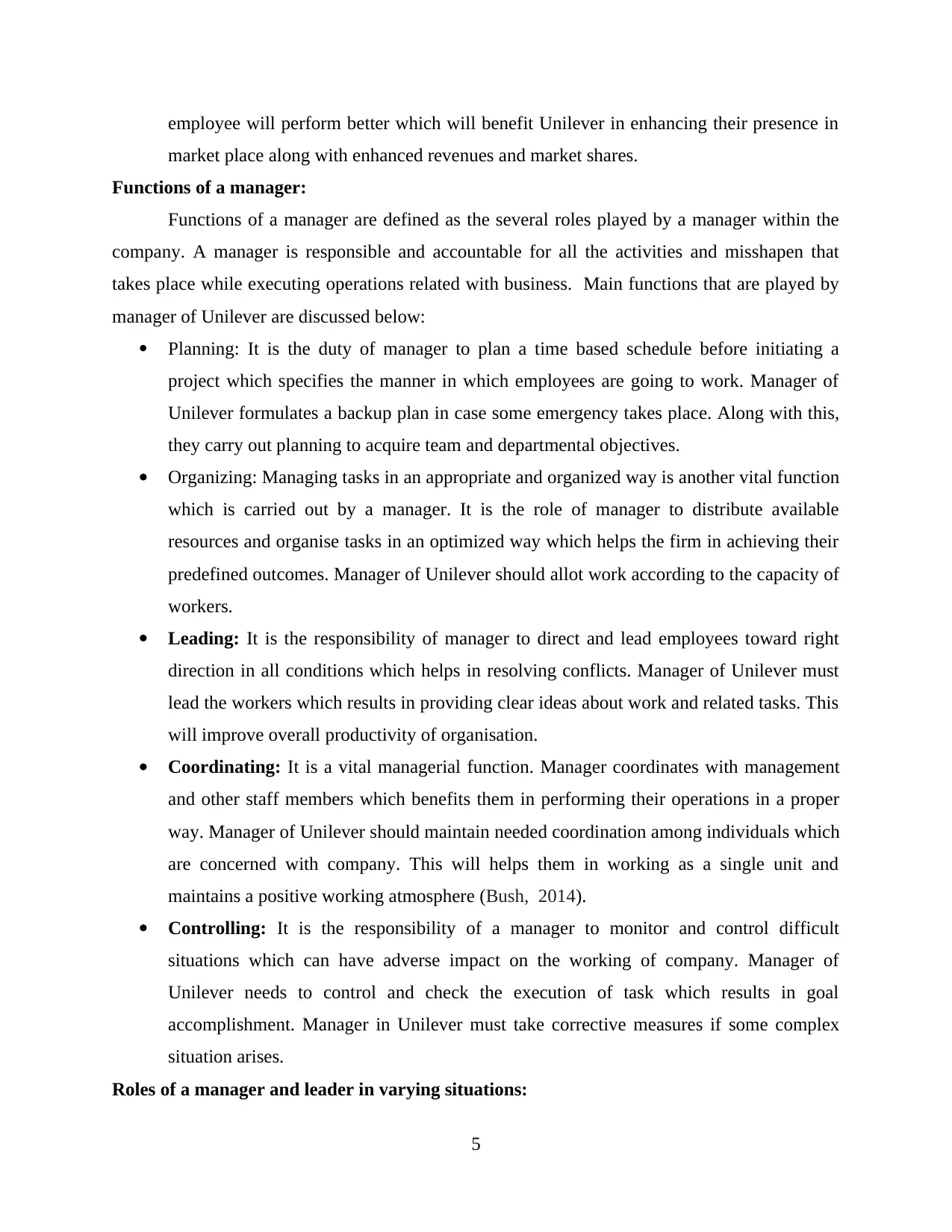
employee will perform better which will benefit Unilever in enhancing their presence in
market place along with enhanced revenues and market shares.
Functions of a manager:
Functions of a manager are defined as the several roles played by a manager within the
company. A manager is responsible and accountable for all the activities and misshapen that
takes place while executing operations related with business. Main functions that are played by
manager of Unilever are discussed below:
Planning: It is the duty of manager to plan a time based schedule before initiating a
project which specifies the manner in which employees are going to work. Manager of
Unilever formulates a backup plan in case some emergency takes place. Along with this,
they carry out planning to acquire team and departmental objectives.
Organizing: Managing tasks in an appropriate and organized way is another vital function
which is carried out by a manager. It is the role of manager to distribute available
resources and organise tasks in an optimized way which helps the firm in achieving their
predefined outcomes. Manager of Unilever should allot work according to the capacity of
workers.
Leading: It is the responsibility of manager to direct and lead employees toward right
direction in all conditions which helps in resolving conflicts. Manager of Unilever must
lead the workers which results in providing clear ideas about work and related tasks. This
will improve overall productivity of organisation.
Coordinating: It is a vital managerial function. Manager coordinates with management
and other staff members which benefits them in performing their operations in a proper
way. Manager of Unilever should maintain needed coordination among individuals which
are concerned with company. This will helps them in working as a single unit and
maintains a positive working atmosphere (Bush, 2014).
Controlling: It is the responsibility of a manager to monitor and control difficult
situations which can have adverse impact on the working of company. Manager of
Unilever needs to control and check the execution of task which results in goal
accomplishment. Manager in Unilever must take corrective measures if some complex
situation arises.
Roles of a manager and leader in varying situations:
5
market place along with enhanced revenues and market shares.
Functions of a manager:
Functions of a manager are defined as the several roles played by a manager within the
company. A manager is responsible and accountable for all the activities and misshapen that
takes place while executing operations related with business. Main functions that are played by
manager of Unilever are discussed below:
Planning: It is the duty of manager to plan a time based schedule before initiating a
project which specifies the manner in which employees are going to work. Manager of
Unilever formulates a backup plan in case some emergency takes place. Along with this,
they carry out planning to acquire team and departmental objectives.
Organizing: Managing tasks in an appropriate and organized way is another vital function
which is carried out by a manager. It is the role of manager to distribute available
resources and organise tasks in an optimized way which helps the firm in achieving their
predefined outcomes. Manager of Unilever should allot work according to the capacity of
workers.
Leading: It is the responsibility of manager to direct and lead employees toward right
direction in all conditions which helps in resolving conflicts. Manager of Unilever must
lead the workers which results in providing clear ideas about work and related tasks. This
will improve overall productivity of organisation.
Coordinating: It is a vital managerial function. Manager coordinates with management
and other staff members which benefits them in performing their operations in a proper
way. Manager of Unilever should maintain needed coordination among individuals which
are concerned with company. This will helps them in working as a single unit and
maintains a positive working atmosphere (Bush, 2014).
Controlling: It is the responsibility of a manager to monitor and control difficult
situations which can have adverse impact on the working of company. Manager of
Unilever needs to control and check the execution of task which results in goal
accomplishment. Manager in Unilever must take corrective measures if some complex
situation arises.
Roles of a manager and leader in varying situations:
5
Paraphrase This Document
Need a fresh take? Get an instant paraphrase of this document with our AI Paraphraser
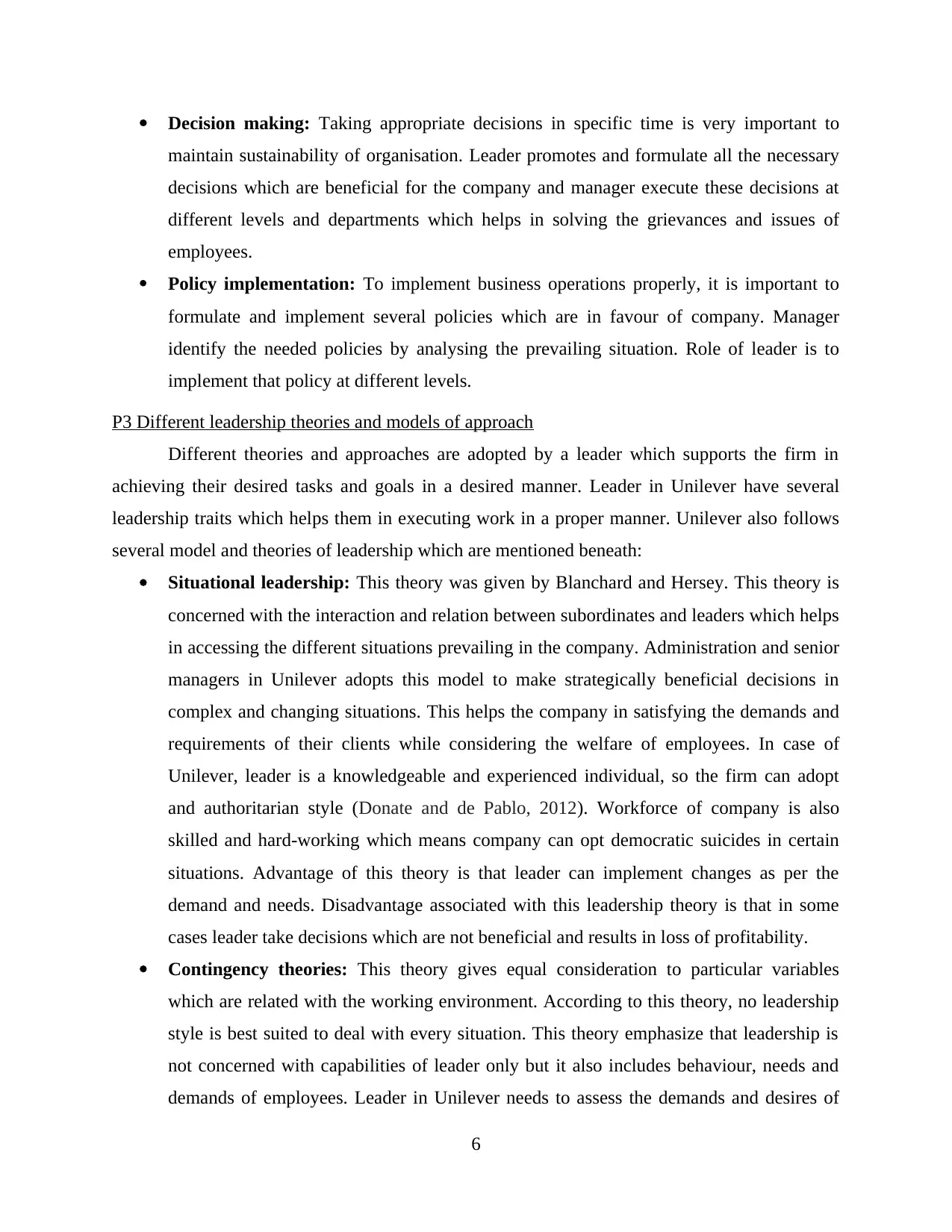
Decision making: Taking appropriate decisions in specific time is very important to
maintain sustainability of organisation. Leader promotes and formulate all the necessary
decisions which are beneficial for the company and manager execute these decisions at
different levels and departments which helps in solving the grievances and issues of
employees.
Policy implementation: To implement business operations properly, it is important to
formulate and implement several policies which are in favour of company. Manager
identify the needed policies by analysing the prevailing situation. Role of leader is to
implement that policy at different levels.
P3 Different leadership theories and models of approach
Different theories and approaches are adopted by a leader which supports the firm in
achieving their desired tasks and goals in a desired manner. Leader in Unilever have several
leadership traits which helps them in executing work in a proper manner. Unilever also follows
several model and theories of leadership which are mentioned beneath:
Situational leadership: This theory was given by Blanchard and Hersey. This theory is
concerned with the interaction and relation between subordinates and leaders which helps
in accessing the different situations prevailing in the company. Administration and senior
managers in Unilever adopts this model to make strategically beneficial decisions in
complex and changing situations. This helps the company in satisfying the demands and
requirements of their clients while considering the welfare of employees. In case of
Unilever, leader is a knowledgeable and experienced individual, so the firm can adopt
and authoritarian style (Donate and de Pablo, 2012). Workforce of company is also
skilled and hard-working which means company can opt democratic suicides in certain
situations. Advantage of this theory is that leader can implement changes as per the
demand and needs. Disadvantage associated with this leadership theory is that in some
cases leader take decisions which are not beneficial and results in loss of profitability.
Contingency theories: This theory gives equal consideration to particular variables
which are related with the working environment. According to this theory, no leadership
style is best suited to deal with every situation. This theory emphasize that leadership is
not concerned with capabilities of leader only but it also includes behaviour, needs and
demands of employees. Leader in Unilever needs to assess the demands and desires of
6
maintain sustainability of organisation. Leader promotes and formulate all the necessary
decisions which are beneficial for the company and manager execute these decisions at
different levels and departments which helps in solving the grievances and issues of
employees.
Policy implementation: To implement business operations properly, it is important to
formulate and implement several policies which are in favour of company. Manager
identify the needed policies by analysing the prevailing situation. Role of leader is to
implement that policy at different levels.
P3 Different leadership theories and models of approach
Different theories and approaches are adopted by a leader which supports the firm in
achieving their desired tasks and goals in a desired manner. Leader in Unilever have several
leadership traits which helps them in executing work in a proper manner. Unilever also follows
several model and theories of leadership which are mentioned beneath:
Situational leadership: This theory was given by Blanchard and Hersey. This theory is
concerned with the interaction and relation between subordinates and leaders which helps
in accessing the different situations prevailing in the company. Administration and senior
managers in Unilever adopts this model to make strategically beneficial decisions in
complex and changing situations. This helps the company in satisfying the demands and
requirements of their clients while considering the welfare of employees. In case of
Unilever, leader is a knowledgeable and experienced individual, so the firm can adopt
and authoritarian style (Donate and de Pablo, 2012). Workforce of company is also
skilled and hard-working which means company can opt democratic suicides in certain
situations. Advantage of this theory is that leader can implement changes as per the
demand and needs. Disadvantage associated with this leadership theory is that in some
cases leader take decisions which are not beneficial and results in loss of profitability.
Contingency theories: This theory gives equal consideration to particular variables
which are related with the working environment. According to this theory, no leadership
style is best suited to deal with every situation. This theory emphasize that leadership is
not concerned with capabilities of leader only but it also includes behaviour, needs and
demands of employees. Leader in Unilever needs to assess the demands and desires of
6
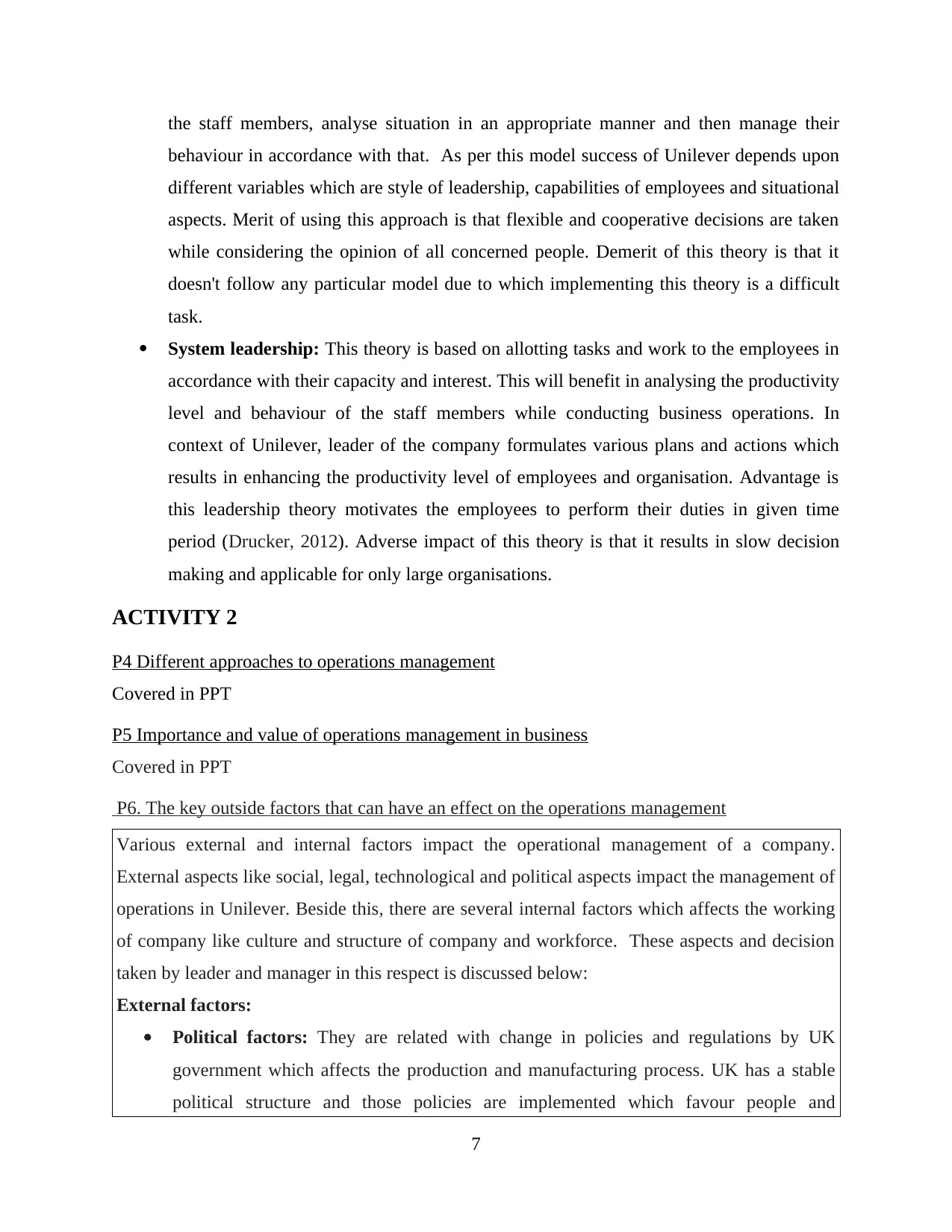
the staff members, analyse situation in an appropriate manner and then manage their
behaviour in accordance with that. As per this model success of Unilever depends upon
different variables which are style of leadership, capabilities of employees and situational
aspects. Merit of using this approach is that flexible and cooperative decisions are taken
while considering the opinion of all concerned people. Demerit of this theory is that it
doesn't follow any particular model due to which implementing this theory is a difficult
task.
System leadership: This theory is based on allotting tasks and work to the employees in
accordance with their capacity and interest. This will benefit in analysing the productivity
level and behaviour of the staff members while conducting business operations. In
context of Unilever, leader of the company formulates various plans and actions which
results in enhancing the productivity level of employees and organisation. Advantage is
this leadership theory motivates the employees to perform their duties in given time
period (Drucker, 2012). Adverse impact of this theory is that it results in slow decision
making and applicable for only large organisations.
ACTIVITY 2
P4 Different approaches to operations management
Covered in PPT
P5 Importance and value of operations management in business
Covered in PPT
P6. The key outside factors that can have an effect on the operations management
Various external and internal factors impact the operational management of a company.
External aspects like social, legal, technological and political aspects impact the management of
operations in Unilever. Beside this, there are several internal factors which affects the working
of company like culture and structure of company and workforce. These aspects and decision
taken by leader and manager in this respect is discussed below:
External factors:
Political factors: They are related with change in policies and regulations by UK
government which affects the production and manufacturing process. UK has a stable
political structure and those policies are implemented which favour people and
7
behaviour in accordance with that. As per this model success of Unilever depends upon
different variables which are style of leadership, capabilities of employees and situational
aspects. Merit of using this approach is that flexible and cooperative decisions are taken
while considering the opinion of all concerned people. Demerit of this theory is that it
doesn't follow any particular model due to which implementing this theory is a difficult
task.
System leadership: This theory is based on allotting tasks and work to the employees in
accordance with their capacity and interest. This will benefit in analysing the productivity
level and behaviour of the staff members while conducting business operations. In
context of Unilever, leader of the company formulates various plans and actions which
results in enhancing the productivity level of employees and organisation. Advantage is
this leadership theory motivates the employees to perform their duties in given time
period (Drucker, 2012). Adverse impact of this theory is that it results in slow decision
making and applicable for only large organisations.
ACTIVITY 2
P4 Different approaches to operations management
Covered in PPT
P5 Importance and value of operations management in business
Covered in PPT
P6. The key outside factors that can have an effect on the operations management
Various external and internal factors impact the operational management of a company.
External aspects like social, legal, technological and political aspects impact the management of
operations in Unilever. Beside this, there are several internal factors which affects the working
of company like culture and structure of company and workforce. These aspects and decision
taken by leader and manager in this respect is discussed below:
External factors:
Political factors: They are related with change in policies and regulations by UK
government which affects the production and manufacturing process. UK has a stable
political structure and those policies are implemented which favour people and
7
⊘ This is a preview!⊘
Do you want full access?
Subscribe today to unlock all pages.

Trusted by 1+ million students worldwide
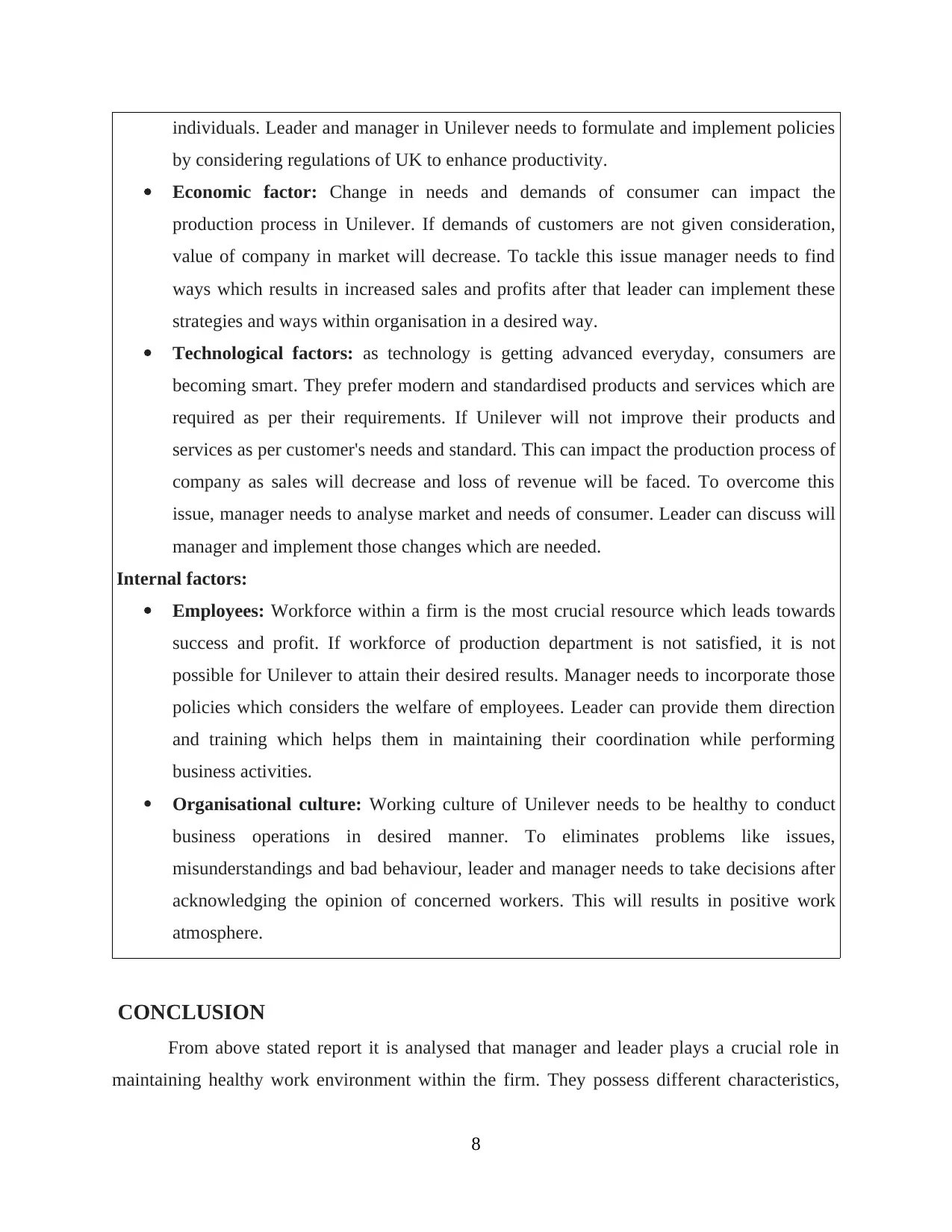
individuals. Leader and manager in Unilever needs to formulate and implement policies
by considering regulations of UK to enhance productivity.
Economic factor: Change in needs and demands of consumer can impact the
production process in Unilever. If demands of customers are not given consideration,
value of company in market will decrease. To tackle this issue manager needs to find
ways which results in increased sales and profits after that leader can implement these
strategies and ways within organisation in a desired way.
Technological factors: as technology is getting advanced everyday, consumers are
becoming smart. They prefer modern and standardised products and services which are
required as per their requirements. If Unilever will not improve their products and
services as per customer's needs and standard. This can impact the production process of
company as sales will decrease and loss of revenue will be faced. To overcome this
issue, manager needs to analyse market and needs of consumer. Leader can discuss will
manager and implement those changes which are needed.
Internal factors:
Employees: Workforce within a firm is the most crucial resource which leads towards
success and profit. If workforce of production department is not satisfied, it is not
possible for Unilever to attain their desired results. Manager needs to incorporate those
policies which considers the welfare of employees. Leader can provide them direction
and training which helps them in maintaining their coordination while performing
business activities.
Organisational culture: Working culture of Unilever needs to be healthy to conduct
business operations in desired manner. To eliminates problems like issues,
misunderstandings and bad behaviour, leader and manager needs to take decisions after
acknowledging the opinion of concerned workers. This will results in positive work
atmosphere.
CONCLUSION
From above stated report it is analysed that manager and leader plays a crucial role in
maintaining healthy work environment within the firm. They possess different characteristics,
8
by considering regulations of UK to enhance productivity.
Economic factor: Change in needs and demands of consumer can impact the
production process in Unilever. If demands of customers are not given consideration,
value of company in market will decrease. To tackle this issue manager needs to find
ways which results in increased sales and profits after that leader can implement these
strategies and ways within organisation in a desired way.
Technological factors: as technology is getting advanced everyday, consumers are
becoming smart. They prefer modern and standardised products and services which are
required as per their requirements. If Unilever will not improve their products and
services as per customer's needs and standard. This can impact the production process of
company as sales will decrease and loss of revenue will be faced. To overcome this
issue, manager needs to analyse market and needs of consumer. Leader can discuss will
manager and implement those changes which are needed.
Internal factors:
Employees: Workforce within a firm is the most crucial resource which leads towards
success and profit. If workforce of production department is not satisfied, it is not
possible for Unilever to attain their desired results. Manager needs to incorporate those
policies which considers the welfare of employees. Leader can provide them direction
and training which helps them in maintaining their coordination while performing
business activities.
Organisational culture: Working culture of Unilever needs to be healthy to conduct
business operations in desired manner. To eliminates problems like issues,
misunderstandings and bad behaviour, leader and manager needs to take decisions after
acknowledging the opinion of concerned workers. This will results in positive work
atmosphere.
CONCLUSION
From above stated report it is analysed that manager and leader plays a crucial role in
maintaining healthy work environment within the firm. They possess different characteristics,
8
Paraphrase This Document
Need a fresh take? Get an instant paraphrase of this document with our AI Paraphraser
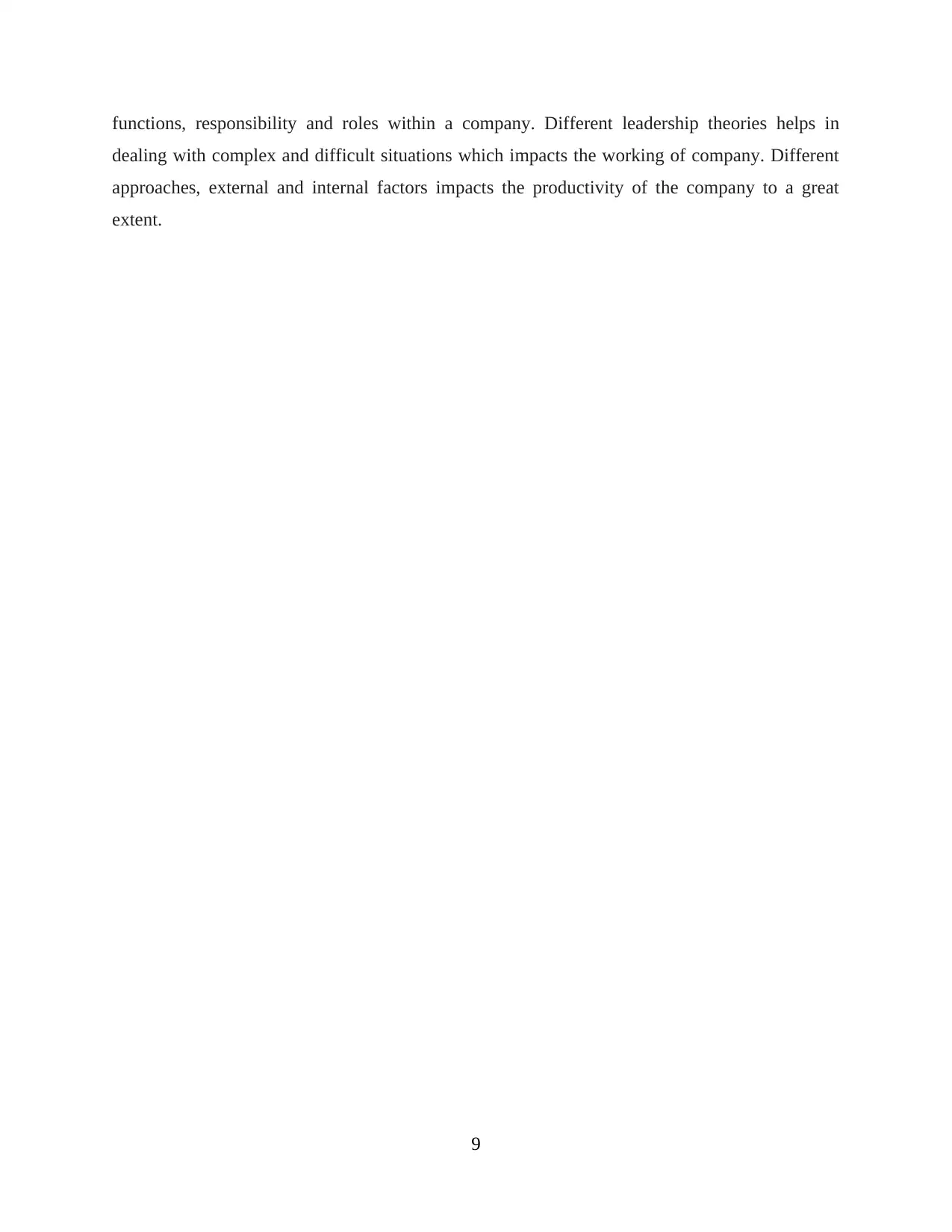
functions, responsibility and roles within a company. Different leadership theories helps in
dealing with complex and difficult situations which impacts the working of company. Different
approaches, external and internal factors impacts the productivity of the company to a great
extent.
9
dealing with complex and difficult situations which impacts the working of company. Different
approaches, external and internal factors impacts the productivity of the company to a great
extent.
9
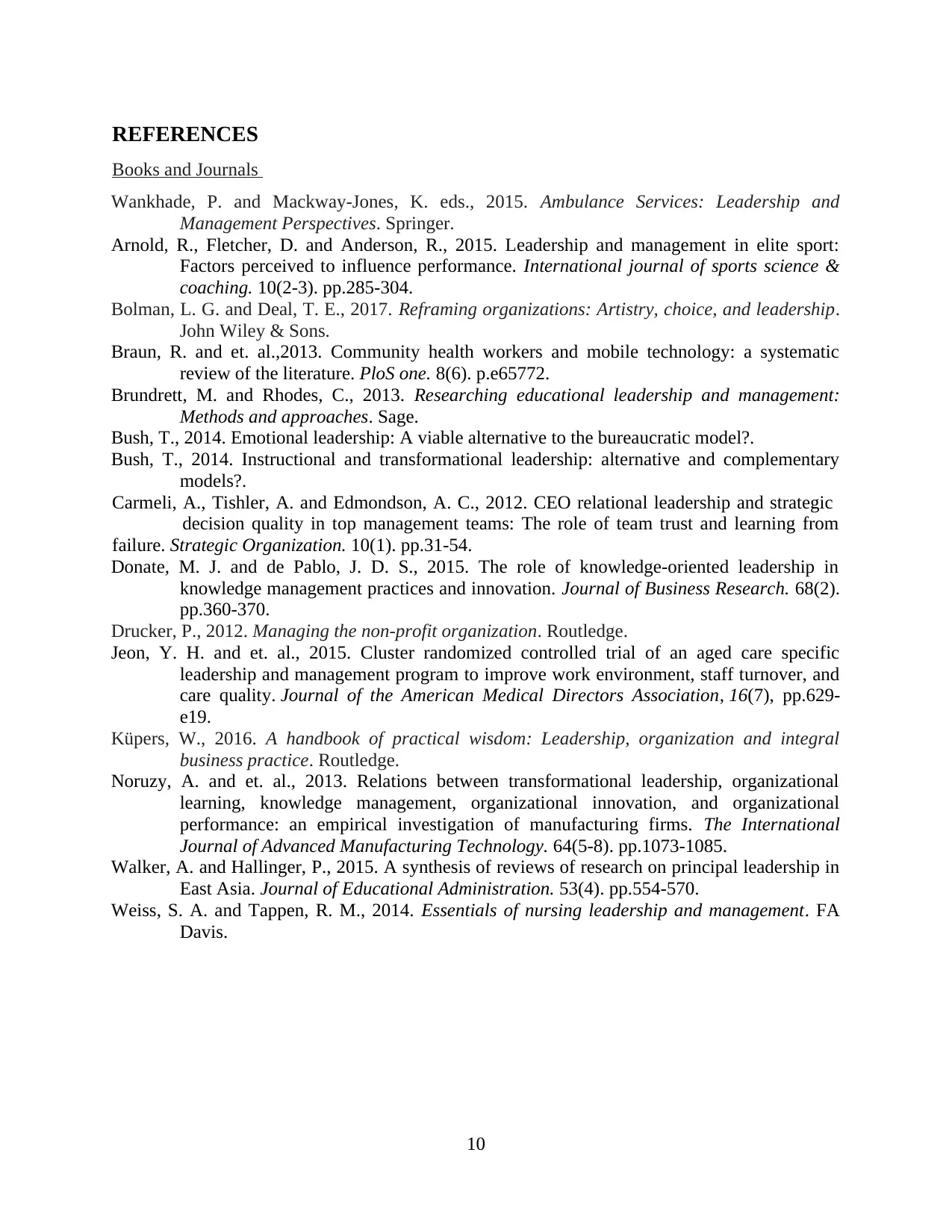
REFERENCES
Books and Journals
Wankhade, P. and Mackway-Jones, K. eds., 2015. Ambulance Services: Leadership and
Management Perspectives. Springer.
Arnold, R., Fletcher, D. and Anderson, R., 2015. Leadership and management in elite sport:
Factors perceived to influence performance. International journal of sports science &
coaching. 10(2-3). pp.285-304.
Bolman, L. G. and Deal, T. E., 2017. Reframing organizations: Artistry, choice, and leadership.
John Wiley & Sons.
Braun, R. and et. al.,2013. Community health workers and mobile technology: a systematic
review of the literature. PloS one. 8(6). p.e65772.
Brundrett, M. and Rhodes, C., 2013. Researching educational leadership and management:
Methods and approaches. Sage.
Bush, T., 2014. Emotional leadership: A viable alternative to the bureaucratic model?.
Bush, T., 2014. Instructional and transformational leadership: alternative and complementary
models?.
Carmeli, A., Tishler, A. and Edmondson, A. C., 2012. CEO relational leadership and strategic
decision quality in top management teams: The role of team trust and learning from
failure. Strategic Organization. 10(1). pp.31-54.
Donate, M. J. and de Pablo, J. D. S., 2015. The role of knowledge-oriented leadership in
knowledge management practices and innovation. Journal of Business Research. 68(2).
pp.360-370.
Drucker, P., 2012. Managing the non-profit organization. Routledge.
Jeon, Y. H. and et. al., 2015. Cluster randomized controlled trial of an aged care specific
leadership and management program to improve work environment, staff turnover, and
care quality. Journal of the American Medical Directors Association, 16(7), pp.629-
e19.
Küpers, W., 2016. A handbook of practical wisdom: Leadership, organization and integral
business practice. Routledge.
Noruzy, A. and et. al., 2013. Relations between transformational leadership, organizational
learning, knowledge management, organizational innovation, and organizational
performance: an empirical investigation of manufacturing firms. The International
Journal of Advanced Manufacturing Technology. 64(5-8). pp.1073-1085.
Walker, A. and Hallinger, P., 2015. A synthesis of reviews of research on principal leadership in
East Asia. Journal of Educational Administration. 53(4). pp.554-570.
Weiss, S. A. and Tappen, R. M., 2014. Essentials of nursing leadership and management. FA
Davis.
10
Books and Journals
Wankhade, P. and Mackway-Jones, K. eds., 2015. Ambulance Services: Leadership and
Management Perspectives. Springer.
Arnold, R., Fletcher, D. and Anderson, R., 2015. Leadership and management in elite sport:
Factors perceived to influence performance. International journal of sports science &
coaching. 10(2-3). pp.285-304.
Bolman, L. G. and Deal, T. E., 2017. Reframing organizations: Artistry, choice, and leadership.
John Wiley & Sons.
Braun, R. and et. al.,2013. Community health workers and mobile technology: a systematic
review of the literature. PloS one. 8(6). p.e65772.
Brundrett, M. and Rhodes, C., 2013. Researching educational leadership and management:
Methods and approaches. Sage.
Bush, T., 2014. Emotional leadership: A viable alternative to the bureaucratic model?.
Bush, T., 2014. Instructional and transformational leadership: alternative and complementary
models?.
Carmeli, A., Tishler, A. and Edmondson, A. C., 2012. CEO relational leadership and strategic
decision quality in top management teams: The role of team trust and learning from
failure. Strategic Organization. 10(1). pp.31-54.
Donate, M. J. and de Pablo, J. D. S., 2015. The role of knowledge-oriented leadership in
knowledge management practices and innovation. Journal of Business Research. 68(2).
pp.360-370.
Drucker, P., 2012. Managing the non-profit organization. Routledge.
Jeon, Y. H. and et. al., 2015. Cluster randomized controlled trial of an aged care specific
leadership and management program to improve work environment, staff turnover, and
care quality. Journal of the American Medical Directors Association, 16(7), pp.629-
e19.
Küpers, W., 2016. A handbook of practical wisdom: Leadership, organization and integral
business practice. Routledge.
Noruzy, A. and et. al., 2013. Relations between transformational leadership, organizational
learning, knowledge management, organizational innovation, and organizational
performance: an empirical investigation of manufacturing firms. The International
Journal of Advanced Manufacturing Technology. 64(5-8). pp.1073-1085.
Walker, A. and Hallinger, P., 2015. A synthesis of reviews of research on principal leadership in
East Asia. Journal of Educational Administration. 53(4). pp.554-570.
Weiss, S. A. and Tappen, R. M., 2014. Essentials of nursing leadership and management. FA
Davis.
10
⊘ This is a preview!⊘
Do you want full access?
Subscribe today to unlock all pages.

Trusted by 1+ million students worldwide
1 out of 12
Related Documents
Your All-in-One AI-Powered Toolkit for Academic Success.
+13062052269
info@desklib.com
Available 24*7 on WhatsApp / Email
![[object Object]](/_next/static/media/star-bottom.7253800d.svg)
Unlock your academic potential
Copyright © 2020–2026 A2Z Services. All Rights Reserved. Developed and managed by ZUCOL.





